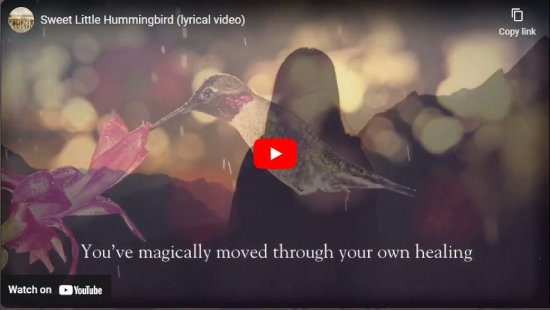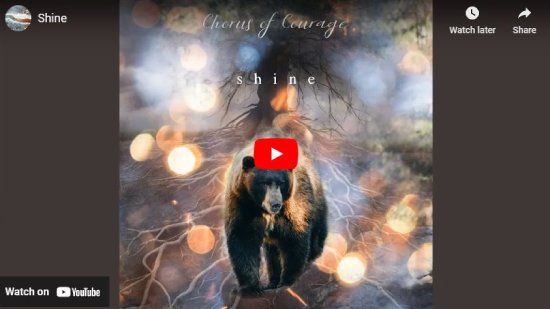Writers who don’t mine their own lives for inspiration will often borrow from others – and not always consensually. If the topic is innocuous, that’s all well and good. But if the subject matter is about deep emotional wounds, can a songwriter really speak for someone with lived experience of trauma?
That was the goal for Chorus of Courage, a project that brings together survivors of abuse with professional songwriters. The end result is a current album, Always By Your Side, produced by Sarah MacDougall, and featuring Julian Taylor, Alysha Brilla, Brad Barr, Lisa Iwanycki, Alex Millaire (of Moonfruits), and five others.
It’s spearheaded by Ontario singer-songwriter Cindy Doire. Formerly one-half of Scarlett Jane with Andrea Ramolo, and with several solo records of her own, Doire spent her pandemic years becoming a registered psychotherapist. Combining her two career paths on this project made sense, in the context of narrative therapy, a method based on the personal account that each person gives of his, her, or their life. She wanted to create “a space where people can share their stories, where those stories can live safely. Because for a lot of folks, there’s often a publication ban, or they can’t talk about their stories.”
Doire, who lives in Bracebridge, ON, reached out to Muskoka-Parry Sound Sexual Assault Services, to put her in touch with survivors who might be interested in her project. Five women signed up, joining five female-identifying songwriters for a retreat near Algonquin Park, where they wrote songs processing their experiences. It was, to say the least, a heavy weekend – but also an incredibly productive and bonding one.

Select the image to play the YouTube video of the Chorus of Courage/Julian Taylor song “Sweet Little Hummingbird”
“I don’t take it lightly to be in a space where everybody’s engaging with such vulnerable experiences,” says Doire. “We wanted to work with survivors who’d already done a lot of healing and were ready to share – because it’s a big step. No one working with us was in crisis. There was a bit of time and space that had already gone by.”
Those songs were then sent to male allies who did the same, a collaborative practice somewhat akin to the exquisite corpse method. Except this wasn’t a parlour game; this was a whole other level of narrative therapy, and one that translated each woman’s experience into two distinct songs. “If somebody shares something with you, and you can summarize it back to them using your own words,” says Doire, “it could lead to a profound level of integration for really hard experiences.”
That was particularly true for Denyse (first name only, for obvious reasons), who was paired up first with Marcia Chum-Gibbons, and then with Julian Taylor. The lyric he wrote based on her experiences, “Sweet Little Hummingbird,” is written in second person, with one lyric that says, “It was never your fault, what happened.”
“For Denyse, she said her whole life, she’s known that it’s not her fault,” says Doire. “But to hear a perfect stranger – and the male voice – sing it to her, she says it’s the first time her heart heard it. It’s an embodied sense of a corrective emotional experience, by hearing the male voice hold space, validate, acknowledge, offer compassion, kindness, all of that.”
That’s true of the female voices, too, of course, which are equally empathetic, whether written in first, second, or third person. Alysha Brilla’s song “Shine” announces, “This world can try, but it can’t steal your light / That spirit you have was made to shine bright / Lay it down my friend, it’s not yours to carry / This is just a chapter, not the ever after of your story.”
Recording was done at the Bathouse near Kingston, Ontario, produced by Sarah MacDougall, and featuring ringers like guitarists Christine Bougie (Bahamas) and Kris Abbott (Pursuit of Happiness), and the rhythm section of bassist John Dymond (Blackie & the Rodeo Kings) and drummer Davide Direnzo (Tom Cochrane). This isn’t just social work: this is a collection of some of Canada’s finest talent bringing their A-game.
The release show was held in March of 2024 at the National Arts Centre, with all five survivors taking the stage alongside their collaborators. It was a brave move that Doire wasn’t expecting, but that, for her, speaks to the transformative healing facilitated by the project.
The audience felt that directly. “We had a bunch of cis-gendered men in the room,” says Doire, “coming up to our [male] allies after [the show] and saying, ‘Thank you for giving me permission as a man to just break down and to cry. Thank you for being vulnerable.’ There were really beautiful conversations with everybody in the room. We went through the whole spectrum of emotion at that show.
“Music gives us a tool to then engage with material that’s really hard to engage with,” she continues. “If we’re just sitting here talking about childhood trauma and sexual assault, it’s heavy. But then music comes and gives us a container: it holds it. That’s the beauty of art. When we’re all going through the darkest periods of whatever life brings, often if you can see yourself in a painting, or in a poem, or in a song, all of a sudden that feels so good and healing, to feel seen through someone else’s art that reflects a part of your experience.”
Of course, most songwriters don’t operate in a therapeutic setting while processing their own darkest emotions, or when they’re required to perform those songs onstage for many nights on end. This, on the other hand, was like ghostwriting a memoir for the survivors. Which carries a different but equally important weight. That’s why both groups of songwriters worked with a psychotherapist who’s also a musician (not Doire), who helped them address the task at hand: memories that might be coming up from their own lives, and also the responsibility to represent the truth of the survivors.
Where does Chorus of Courage go from here? “We’re planting these seeds, and it’s a conversation,” says Doire. “That’s why the call-and-response was important. Let’s create a space where we could all hold it together. Let’s try to make sense of shit that doesn’t make sense. There’s so much need for that right now, with everything going on in the world.”
